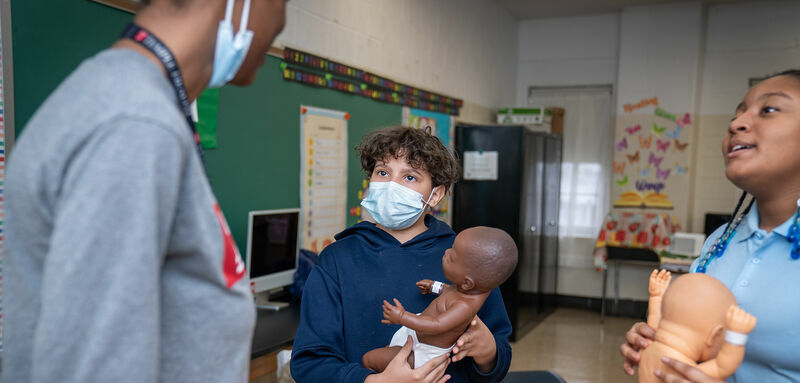Temple physician explains why measles is so contagious
Carlene Muto, medical director of infection prevention and control for Temple Health, highlights importance of being vaccinated against the viral disease.

The U.S. is currently experiencing one of the largest measles outbreaks in decades with more than 500 cases reported in West Texas.
Since the outbreak began in January in West Texas due to low vaccination rates, there have been three measles-related deaths. More than 700 cases were confirmed across the country in 25 jurisdictions.
The World Health Organization had declared measles eliminated from the U.S. in 2000 due to robust vaccination efforts. However, the highly contagious viral disease started making a resurgence amid declining vaccination rates.
The Centers for Disease Control and Prevention’s website says two doses of the measles, mumps and rubella (MMR) vaccine provides the best protection against the disease. The first dose is given to children who are between 12–15 months, and the second dose is given between the ages of 4–6.
Symptoms of the virus include a fever, cough, red, watery eyes, tiny white spots on the oral mucosa and a rash that spreads downward.
According to the CDC, if one person has measles, up to 9 out of 10 people nearby will become infected if they are not vaccinated. So why is measles so contagious? Temple Now asked Carlene Muto, medical director of infection prevention and control for Temple Health and an alum of the Katz School of Medicine, to address what’s causing this measles outbreak.
Temple Now: Why is measles so contagious and who is most at risk?
Carlene Muto: It’s easy to spread. The virus lives in your respiratory tract and so anytime you cough or sneeze or even talk, you can create these droplets that contain the virus, and it could stay in the environment for long periods of time. The disease could stay on surfaces or in the air for a couple of hours. This is similar to influenza but there is something about this virus that makes it much more easy to spread.
You could easily breathe it in or touch one of those surfaces and touch your eyes or nose or your mouth and if you’re not vaccinated, you have a very high likelihood of getting the disease. So that’s why it is spreading like wildfire in Texas. The folks there aren’t vaccinated.
TN: What are the serious complications of measles?
CM: The things that we worry about are complications from your respiratory tract. You can get things like pneumonia or bronchitis. All those things could put you at risk for worsening outcomes.
I think the even more concerning things are the neurological complications you can get. You can get encephalitis, which is inflammation of your brain, which could result in permanent brain damage, and you could end up with hearing loss or vision loss.
Sometimes folks just get seizures when they have measles and maybe that’s because their fever is so high or maybe it’s because you’re sort of irritating the brain tissue. The worst thing that could happen is death.
TN: What are some misconceptions that deter parents from vaccinating their children?
CM: It’s not just with measles; it’s with all vaccines. There is a whole group, we call them antivaxxers, and they have firm beliefs that vaccines are bad. One of the things that got tossed around years ago is that vaccines cause autism, and so parents were very reluctant to give their children vaccines if they thought in fact that they could get autism.
How it all started was way back in the 90s, there was a study published that made that association, but it was a terrible study. It was bad science. Many studies, including one by the CDC, went on to disprove that.
The rest of the reasons are people aren’t informed. Sometimes people think you can get sick from a vaccine. You often hear folks say, “I got the flu from my flu shot.” Although there are minor side effects from vaccines, like pain or redness at the injection site, muscle aches, or a low-grade fever, they are not from the flu. These reactions are the body’s immune system responding to the vaccine and typically subside within a day or two. Some people think “oh I don’t have to get it, that disease is not around anymore.”
TN: What else do people need to know about measles?
CM: The rash looks different. It has a red and blotchy appearance. It is called a maculopapular rash which means that it is both flat and raised. It doesn’t look like the chickenpox rash or rashes that you get from other viral illnesses.
It first appears on your head, and it just works its way down to the chest, trunk, arms and legs. You could see it on your hands and feet. Most rashes don’t appear on your hands and feet.
If you or someone you know thinks they have measles, it’s important not to expose the virus to others. It’s important to get yourself under care and to stay isolated so that you don’t pass it on to other people.
Your doctor will let the Department of Health know so they can help identify people that you may have exposed.
If you are exposed, call the Department of Health. In Philadelphia, during business hours call 215-685-6748 and after business hours and weekends call 215-686-4514. They will help to get you vaccinated right away, which could prevent you from getting the disease.
-
Medicine at Temple: The Lewis Katz School of Medicine at Temple University is dedicated to educating and training students to be outstanding physicians prepared to meet the healthcare needs of diverse patient populations.
-
Doctor of medicine: Top tier faculty from the Doctor of Medicine program empower students with the knowledge, skills and confidence needed to succeed in this rigorous profession.
-
Become an Owl: Learn more about applying for one of our undergraduate, graduate or professional programs.


